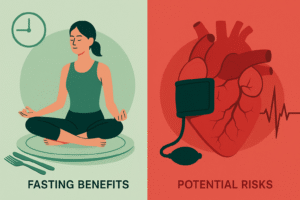Fun Fact: Did you know that short-term stress can actually boost your immune system? However, long-term stress can have the opposite effect!
Stress is a universal experience, and whether it’s dealing with work deadlines, personal relationships, or health issues, we’ve all been there. But have you ever wondered how stress affects both your physical and mental well-being? In this blog, “The Biology of Impact of Stress on Physical and Mental Health,” we’ll dive deep into how stress alters the body and brain and why understanding these effects is essential for your overall health.
What Happens in Your Body When You’re Stressed?
When you experience stress, your body activates the “fight-or-flight” response, a survival instinct passed down from our ancestors. During this response, the adrenal glands release cortisol (a stress hormone) and adrenaline, preparing your body to react to the perceived threat. Heart rate increases, blood pressure rises, and your senses become sharper.
While this response is helpful in short bursts—like avoiding an accident—it becomes harmful if the stress is prolonged. Constant exposure to high cortisol levels can lead to several physical health issues.
Physical Health Impact
Immune System Suppression
While stress can temporarily enhance your immune function, prolonged stress weakens it, leaving your body more vulnerable to infections and slowing down recovery. Studies show that people under constant stress have lower white blood cell counts, which are crucial for fighting off illnesses.
Cardiovascular Health
Stress can lead to heart issues such as high blood pressure, irregular heartbeats, and an increased risk of heart attacks. A study found that people in high-stress jobs with long hours had a 20% higher likelihood of developing cardiovascular disease compared to those in less stressful positions.
Digestive Issues
Your digestive system also takes a hit when you’re under stress. Have you ever felt “butterflies” in your stomach before a big presentation? That’s your gut reacting to stress. Long-term stress can cause more severe problems like irritable bowel syndrome (IBS) and acid reflux.
Sleep Disorders
Long-term stress is a major contributor to sleep issues, including insomnia. The constant release of stress hormones makes it hard for your body to relax, leading to poor-quality sleep. Sleep deprivation worsens stress, creating a negative loop that affects both your mental and physical health.

Mental Health Impact
Anxiety and Depression
When stress persists, it starts to wear down your mental health. Research has shown a direct link between chronic stress and the development of anxiety and depression. Cortisol, the hormone released during stress, impacts brain areas like the hippocampus, which controls memory, and the amygdala, which governs emotions, leading to greater emotional instability.
For instance, a case study involving college students during exam periods revealed heightened levels of anxiety and symptoms of depression. These mental health challenges often persist even after the stressor is removed, leading to long-term issues.
Cognitive Decline
Stress can have serious effects on cognitive functions such as memory, decision-making, and attention span. Elevated stress hormones can impair the functioning of the prefrontal cortex, which is crucial for reasoning and decision-making. This is why, under stress, you might find it harder to concentrate or make decisions.
Research indicates that chronic stress may raise the likelihood of neurodegenerative conditions like Alzheimer’s, as it speeds up brain aging.
Emotional Exhaustion
Ever heard of the term “burnout”? It’s a state of emotional, physical, and mental exhaustion caused by prolonged stress. Burnout isn’t just about being tired; it’s about feeling detached from your work, friends, and even family. This emotional drain has far-reaching impacts, including reducing job performance and damaging personal relationships.
Case Study: How Stress Affected Frontline Workers During the Pandemic
A recent case study explored the mental and physical health of frontline healthcare workers during the COVID-19 pandemic. The findings revealed that 70% of participants reported symptoms of stress-induced anxiety, depression, and sleep disorders. Many also experienced physical symptoms, such as headaches, gastrointestinal problems, and a weakened immune system. This case study highlights the significant impact of prolonged stress in high-stress environments, providing insight into how stress affects all of us during challenging times.
Coping with Stress: What Can You Do?
Understanding how stress impacts your body and mind is just the first step. The next step is learning how to manage it.
Exercise
Physical activity is one of the best stress-busters out there. Exercise lowers cortisol levels while releasing endorphins (the feel-good hormones), making you feel more relaxed and happy.
Mindfulness and Meditation
Mindfulness techniques, such as deep breathing and meditation, can effectively reduce stress by helping the mind relax. These practices focus on staying in the present moment, which lowers anxiety and promotes mental clarity.
Sleep Hygiene
Enhancing sleep quality is a powerful way to lower stress. Developing consistent sleep habits, reducing screen time before bed, and establishing a calming routine can help.
Social Support
Talking about your stress with friends, family, or a therapist can help alleviate the burden. Humans are social creatures, and having a support system can make a world of difference in how we manage stress.
The Biology of Stress and the Power of Awareness
Being aware of how stress affects your physical and mental health is empowering. The more we understand the biological mechanisms behind stress, the better equipped we are to mitigate its negative impacts. So, the next time you feel overwhelmed, remember that there are science-backed ways to regain control and protect your well-being.
Conclusion
While stress is a normal aspect of life, ongoing stress can have serious negative effects on both mental and physical health. From cardiovascular diseases to cognitive decline, the effects of prolonged stress are far-reaching. But the good news is that there are effective ways to manage stress and mitigate its impact on your body and mind.
Taking steps like exercising regularly, practising mindfulness, and getting quality sleep can make a significant difference in how you handle stress. Now that you know the biology behind stress, you’re better prepared to keep it in check and live a healthier, more balanced life.
Author’s Note
Stress is something we all deal with, and I hope this blog has given you some insight into how it impacts your body and mind. By learning how stress works, you can take proactive steps to manage it. If this article resonated with you, feel free to share it with others who might find it helpful.
G.C., Ecosociosphere contributor.
References and Further Reading
- American Psychological Association – Understanding Chronic Stress
- Harvard Health – The Physical Toll of Stress
- Effects of Stress on Mental Well-Being – UXO Supplements. https://www.uxosupplements.com/blogs/all-blogs/effects-of-stress-on-mental-well-being




